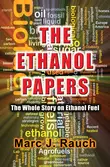Stop the Anti-Ethanol Ridiculousness
 |
An open letter reply to an unmistakable editorial failure
By Marc J. Rauch
Exec. Vice President/Co-Publisher
THE AUTO CHANNEL
Author of THE ETHANOL PAPERS
Originally published November 25, 2019
 Marc Rauch |
Dear Editors -
The anti-ethanol editorial written by Mario Loyola, "STOP THE ETHANOL MADNESS," is highly problematic. I don't mean that it's a "problem" to the ethanol industry, or ethanol as a fuel source,
or to America's struggle for energy independence, per se. I mean it's a problem to The Atlantic and to Mr. Loyola because of it's many inaccuracies and misinterpretations of facts.
 Mario Loyola |
The understanding that petroleum oil is not created from dying dinosaurs and other living creatures, but rather from minerals, means two things: The correct term is not "fossil fuels" but "abiotic fuels," and that even as you read this rebuttal the natural process of creating oil within the planet Earth continues. Mankind will probably never be without petroleum oil - the question is, just because we can find more poison, do we really want to use it and continue to be suckers?
Therefore, the issue that the world faced in the 1970's was not oil supply, but manipulation by the gatekeepers of the oil. These gatekeepers are the foreign regimes that 'temporarily' control the locations, and the corporate entities (with government approval) that allowed the foreign regimes to assume control of the oil because it was the one way to achieve far higher prices for a never ending substance.
Mr. Loyola's own comments about Saudi Arabia's "suddenly doubled production" and world glut of oil demonstrate all this. Unfortunately, Mr. Loyola (as is typical of the regular group of anti-ethanol commentators), turns a blind eye to the manipulation and dependence on hostile entities (both foreign and domestic) and wrongly casts ethanol and other alternative solutions as the villain of the 1970's oil crisis.
The market for petroleum fuels is entirely invented. Gasoline was never needed for general internal combustion engines, and petroleum diesel fuel was never needed for Rudolph Diesel's heavy duty engine that bears his name. Combustible fuels created from crops and other decaying substances could easily replace petroleum oil fuels, then and now. Other than very local and very temporary circumstances (such as conditions making a roadway impassible for fuel trucks, or military action in a war), there should never be an issue of fuel availability anywhere in the world. Fuel should be sourced locally from the best and most abundant raw materials. The raw materials might be planted crops, human and animal waste, naturally occurring organisms like algae, and in some instances abiotic fuels made from crude oil and coal. But "fuel availability" should never again be something that is used to enslave any group of humans.
Mr. Loyola next brings the baseless issue of climate change into his anti-ethanol argument. I'm not arguing the existence of man-made climate change (I've done this elsewhere), but rather that it's an irrelevant issue. What is relevant is that significant air and water pollution - regardless of whether it rises to the level of catastrophic calamity for our planet - along with serious health consequences and wars, are caused by petroleum oil fuels. There is no equivocation on this. Corn ethanol...indeed any ethanol is not a comparable cause of environmental or existential concerns. Yes, there are some absurd studies conducted by persons receiving funding from the oil industry (just as the tobacco industry funded lots of absurd studies defending the use of tobacco products), but these are all always successfully rebutted by other more credible studies that prove ethanol is far cleaner. In addition, the simplest of all tests, visible to all observers, is the physical comparison of burning gasoline and burning alcohol. Gasoline produces black smoke, ethanol does not. The black smoke are the carbon particles that blacken our skies and our lungs.
As egregious as the comparison between gasoline and ethanol is, Mr. Loyola insinuates an even dumber comparison when he writes that ethanol's "sole beneficiaries are large agricultural corporations—and the politicians who serve them." The reverse is actually more correct: the sole beneficiaries of petroleum oil fuels are the far, far larger oil industry corporations, terrorist regimes, and the domestic politicians who serve them. There is no comparative equivalent. No country or state invades another over ethanol issues. Nobody hijacks an airplane or blows up a school bus filled with children over ethanol issues. None of our military personnel have ever been killed or disabled defending ethanol and its agricultural corporations. The beneficiaries of ethanol fuel are the citizens of our country (in fact the citizens of any country smart enough to use ethanol fuel), and the beneficiaries include our domestic hardworking farmers.
Mr. Loyola's comments about corn ethanol being the mainstay of the Renewable Fuel Standard are way off course. Corn ethanol has been the mainstay of the RFS Standard because corn is generally the best crop to use given America's general climate conditions and crop familiarity. Other crops can easily be used, but as long as ethanol fuel usage is limited by government edict (which is exacerbated by the false information promulgated by the oil industry) other options are superfluous at this time. Greater public understanding of ethanol's benefits leading to greater demand and usage might inevitably require other crops and raw materials. The processes to produce ethanol from these other sources, including cellulosic sources, would improve financially, making them more affordable - this is a basic economic fact-of-life that someone representing the "Competitive Enterprise Institute" should understand...unless that person has no understanding of basic business issues.
When the oil industry was given the opportunity to replace tetraethyl lead (TEL) as an anti-knock ingredient and as a way to diminish America's reliance on foreign oil, they responded by using methyl tert-butyl ether. In essence, their solution to killing the public with TEL was to give us another poison (MTBE). That's what the oil industry does; this is their level of thinking and how little respect they have for the public.
The RIN system was created and deployed to protect against cheating by the oil industry, to certify that the proper amount of ethanol was being used. If the oil industry wasn't so crooked and self-centered it wouldn't have been necessary. Unfortunately the system opened the door for a credit trading game that's as idiotic as the carbon credits trading system, and it smacks of all the evils associated with stock and commodity exchanges. As far as I know, there are no "meat-filler" credit exchanges where a food processor could use saw dust or squirrel meat to replace beef in a package of beef hamburger meat simply by buying a "meat credit." Instead, the honesty is controlled and patrolled by inspectors, and the system works fairly well, even if horse meat sometimes turns up in a meat package. But then, at least, we know that something crooked occurred and steps can be taken to fix and mitigate the problem. The costs for this supervision should be paid for by the oil entities. Why Loyola would even question it is a question.
Opening the opportunity for RIN credits and carbon credits to be bought and sold guarantees corrupt behavior. This idiotic RIN system is not the fault of ethanol or its producers, nor does it diminish the quality
of ethanol as a fuel. The inclusion of RIN related problems into his editorial is an example of the madness that affects ethanol opponents. Loyola was attempting to find something, anything, to indict ethanol. In any
event, ethanol is, and has always been, a superior fuel...as attested to by the oil industry's leading gasoline producers.
SEE: The Hypocrisy of Big Oil and API
Mr. Loyola further displays his ignorance (or perhaps just a sponsored-dislike of ethanol) by getting into a discussion and attempted explanation of the "blend wall." The "blend wall" is a mythical wall that pretends there is a limitation to how much total ethanol can be used based upon the number of gasoline-powered internal combustion engine vehicles on the road. This is predicated upon the notion that most vehicles can only use 10% ethanol. The 10% figure is completely arbitrary. Actual usage and testing for more than 100 years proves that any internal combustion engine can use significantly more ethanol in a ethanol-gasoline blend without any harm done to the engines. Most recently and publically this has been proven by the EPA when it certified E15 for all modern cars and light trucks, and when they acknowledged that their E15 testing also included E20 testing (with no negative effects). The myth of the blend wall has also been exposed by Brazil's mandated use of E27, and the many decades of ethanol use in Great Britain by the two oil company giants Standard Oil and Cities Service (they sold ethanol-gasoline blends up to E30 and marketed them as being superior in every way to gasoline without ethanol). The vehicles sold in Brazil and the vehicles that were sold in Great Britain were and are the same as the vehicles sold in America.
Moreover, since ethanol is compatible with more types of rubbers, plastics, and metals than gasoline and aromatics, all gasoline-powered internal combustion engines can safely and efficiently use ethanol levels far above E30. The only difference between flex fuel E85 vehicles and fuel injected non-flex fuel vehicles is the onboard computer software, which can be easily updated (except that the government prohibits it).
Mario Loyola writes that "ethanol mandates are a marvelous candidate for deregulation." This comment might have some validity, if we actually had "ethanol mandates," and perhaps in the near future after sufficient factual information about ethanol is disseminated, we will have some national mandates for E40, E50, E60 and of course, E85 or higher. But for now, there are no ethanol mandates. The biofuel mandate does not specify ethanol. The oil industry could choose to use something else, if they could find something that's cleaner, less expensive, and safer to use.
Mr. Loyola writes that "A major 2011 study by the National Academies of Sciences found that biofuels can be cost-competitive with fossil fuels only in an economic environment of high oil prices. It assessed that biofuels would only be competitive with fossil fuels by 2022 if gasoline was about $5 a gallon (or $191 per barrel of crude oil)." There's lots of interesting things about this statement that Loyola obviously doesn't take into account, just as David Pimentel and Tad Patzek didn't when they published their fallacious studies on ethanol costs (these fallacious studies are the basis for virtually all the incorrect commentaries from writers like Robert Bryce). What I'm referring to are such things as the increasing efficiency of planting, growing, and harvesting of corn - there have been marked agricultural improvements since 2011 (the NAS used data that's almost a decade old, if not older). The NAS study also doesn't take into account the increased costs of using ingredients other than ethanol to increase octane and mitigate engine knock. Their calculations were most likely based solely on the cost per barrel of oil, not on the price of benzene or other similar octane boosters, which are always significantly higher. The oil industry was always capable of refining a gasoline that didn't cause engine knock (without TEL or ethanol). The problem was the cost of that highly refined gasoline, and so they searched for alternatives. People who don't really know the history of engine fuels don't know this. I'm of the opinion that if you're gonna pass yourself off as some kind of expert in a field you should learn something about that field before you offer your "expertise."
The other thing that Mr. Loyola and the NAS study doesn't take into account are possible cancellations to the many subsidies given to the oil industry. Retiring some of the oil subsidies can have a major impact on the price of gasoline (such as making the oil industry pay for the cost of U.S. military presence and defense of worldwide oil facilities). This could easily send gasoline to $10 or more per gallon. Ethanol's current wholesale price is $1.44 per gallon (around the lowest price it's been in more than 10 years). Oil would have to fall to $40 or less per barrel to compete with ethanol. It's possible, but then say goodbye to oil from fracking and tar sands. And then, there's the "mother of all things" that could affect the price of petroleum oil and its fuels: MORE WARS. So when you speculate on cost competitiveness between gasoline and ethanol, it's important to consider all reasonable possibilities. Another war is always a reasonable possibility, and with a presidential administration that's actively cutting fat from other pork projects, and calling on nations to pay more of the burden for their own defense, I don't know how the price of gasoline could fall sufficiently to beat the price of ethanol as it did 100 years ago. Trump's second term in office, something that looks more and more imminent, will take his administration out to January 2025. I think the NAS projection is fantasy.
On top of all that I have just presented is the ironic contrary fact that ethanol is actually the oil industry's road to salvation. Internal combustion engines are marvelous machines. The drawback to these
marvelous machines is the dirty, filthy, deadly petroleum oil fuels that they use. Electric motors are cleaner than gasoline and diesel internal combustion engines. As the public's dissatisfaction with petroleum
fuels' health risks continues to grow, the acceptance and use of electric vehicles also will grow. Electric motors displaces the need for gasoline and diesel. Eventually, the petroleum oil industry and most
industries related to internal combustion engine parts, repair services and fueling services will die, too. However, internal combustion engines powered by high level ethanol-gasoline blends can be as clean or cleaner
than electric motors. Global adoption of more ethanol will save the petroleum oil industry if they are smart enough to stop their opposition to ethanol (just as they have done in Brazil). What's more, the
environmental and health benefits of using more ethanol can happen immediately, starting today!
SEE: The Argument Is Over: ETHANOL IS THE BETTER FUEL!
SEE: The Moral Case
for Internal Combustion Engines Powered By Ethanol.
This is the kind of truthful information that The Atlantic should be reporting. This is the kind of factual information and insight that any fellow who imagines himself qualified to serve The White House should know.
Thank you for your time. I look forward to any response that The Atlantic or Mr. Loyola would like to make.
 |


